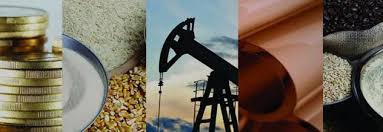10 Sep 2022
What is Commodity Market? Basics, Evaluation & Challenges

Investors often use commodity trading in investment parlance. The market trades various commodities, allowing you to diversify your portfolio and enhance your gain. Investing in commodities with wisdom can lead to good returns in the long run since their prices will likely change over time.
All this is possible when you have the proper guidance and knowledge to execute in this market. However, finding a trustworthy stock market institute that can provide unerring expertise is quite arduous. What if we assure you there is a panacea to this problem? YES!
The National Institute of Wall Street(NIWS) is India's finest share market classes in Jaipur.
The institute offers a comprehensive list of courses on NSE, BSE, SEBI, NCFM, and NISM modules in the Investment and Trading Professional Domain.
If you want to invest your money in the right place and get high returns, then NIWS courses for investors and NIWS courses for traders could greatly benefit you.
In the meantime, let's explore the details of the commodity market to learn about their working and other features.
What Is Commodity Market?
A commodity is a primary raw material that is used to produce items for everyday use.
An investor trades commodities such as spices, gold, and other primary products in a commodity market.
Commodities fall into two categories:
-
Hard Commodities- gold, rubber & oil.
-
Soft Commodities- corn, sugar, soybean & wheat.
Types Of Commodities Market
For readers who wish to fetch clarity about what commodity is in the share market, there are two types:
|
SPOT MARKETS, |
DERIVATIVE MARKETS |
|
|
Commodities Exchange,
The whopping size of the Indian Commodity Market is 92.23 Lakh crore.
If an investor wants to participate in the commodity market, he must understand how to trade in a commodity exchange.
A commodity exchange is an exchange or a physical centre that regulates & compels the rules and regulations for trading standardized commodity and investment-related products.
Indian commodity exchanges include the following types:
-
Multi Commodity Exchange (MCX)-
MCX operates in over 40 countries and is the largest commodity exchange in India. It was established in 2003. Commodities traded in MCX are bullion, metals, energies, and spices.
-
National Commodity Exchange (NCDEX)-
This commodity exchange specializes in agricultural trading. It was established in 2003. Commodities traded in NCDEX are pulses, fibers, oil, and oil seeds.
-
National Multi Commodity Exchange (NMCE)-
It was established in 2003. NMCE trades seeds, mustards, soybeans, copper, black pepper, lead, zinc, jute, and gold.
-
Indian Commodity Exchange (ICEX)-
ICEX is a screen-based online derivative exchange that was launched in 2019. Commodities traded in ICEX include gold, silver, diamonds, copper, crude oil, natural oil, and iron.
-
The Ace Derivative Exchange (ACE)-
In May 2015, this exchange expired all its existing contracts & discontinued all its trading operations.
-
The Universal Commodity Exchange (UCX)-
After going live in 2012, UCX was closed by regulators in 2014 because of suspicions of fraud.
Participants Of Commodity Market
Commodity markets have two types of participants:
-
Hedgers
A hedger is a producer or manufacturer who enters into a futures contract to reduce their exposure to market volatility.
For example, if a farmer suspects that prices will fluctuate during a harvest season and might lose some money, he hedges his risk with the futures contract.
If the price falls, the farmer can alleviate his risk by making profits from the futures contract. If the price rises, the farmer can lessen this risk by making a profit in the local market.
-
Speculators
Speculator investors aim to generate substantial profits in the commodity market. Before signing the futures contract, these investors anticipate the direction of market prices.
For example, let's say an investor predicts that the price will go higher. In this case, investors purchase more future contracts with the aim that if the price rises, they will sell those contracts higher than the mentioned price. And somehow, if the prediction goes wrong, they will sell those commodities at a lower price and repurchase them to balance off their losses during the price rise phase.
Reasons To Invest in a Commodity Market in India-
To be a successful trader, one must understand commodity basics and accurately evaluate risk.
Here are a few reasons you should invest in commodities:
● Diversification Of Portfolios
You might have heard many investment pundits say that portfolio diversification is crucial for wealth creation. They are right; commodities expose your portfolios to a different class of assets, lowering your risk and allowing you to ride volatile markets.
-
Inflation protection
Trading in commodities can protect your portfolio since the prices of certain "hard assets" rise over time, guaranteeing increased profits.
-
Transparency In The Process
In commodity futures, trading is supposed to be transparent.
Having large-scale participation ensures you will have a fair price.
In turn, it reflects the different perspectives and outlooks of a wide range of commodity traders.
-
Profitable Returns
If liquidity is enormous, commodities hold risk in the form of investments. A company can either make a tremendous profit or suffer a heavy loss.
Thus, investing correctly in the commodity market can lead to huge profits.
Factors Determining Commodity Market Prices
Factors that determine the commodity price are:
-
The demand and supply factor affects the commodity's price. If the demand for a specific commodity is high (i.e., there are more buyers than sellers), then the price of that commodity will rise. In contrast, if the demand for the same commodity is low (i.e., there are more sellers than buyers), then the price of that commodity will be low.
-
A commodity demand is dependent on its current & future use.
For example, heating costs will likely increase if the weather is cold. Therefore, the price of natural gas will increase due to high demand as a commodity.
-
Political events and policies can affect exports and imports. For example, higher import duties can raise commodity prices.
-
In a weak economy, the demand for commodities is often low, especially those related to construction and transportation. In contrast, a booming economy increases demand, resulting in higher prices.
Conclusion-
A great way to beat inflation in India is through commodity trading since commodities rise in cost when inflation increases. Therefore, an investor needs to be well-versed with the answers of what the commodity market is and trading strategies to wave off the risks. Commodity futures contracts, however, have a high degree of leverage, making them extremely risky. Regardless of the trading strategy used, monitoring the commodity market is crucial.
The stock market institute in Jaipur provides all these monitoring skills and the right guidance with proper knowledge.
You get to learn from the best faculty at NIWS, who have 15 – 20 years of experience in the international and domestic stock markets. Students receive practical and live instruction for commodity training and options strategies from these veteran professional faculty members.
Book Your Free Online Demo Class now to learn more, or contact our experts at 9261623456 for more assistance.
